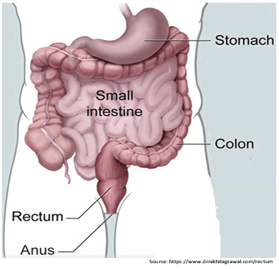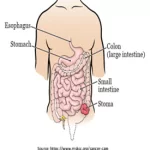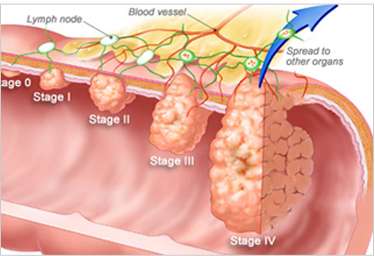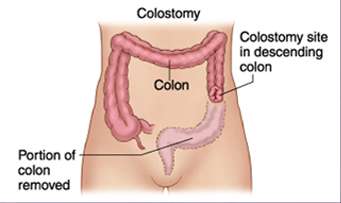
Rectal Cancer Treatment in Bangalore
Rectal cancer is a type of cancer that originates in the last six inches of the large intestine, the rectum. Like other organs in the body, the rectum is susceptible to various diseases and ailments, including cancer.
When diagnosed with rectal cancer, you are likely to have many queries. At MACS Center, no patient has to battle a rectal cancer diagnosis alone. Our team of gastrointestinal cancer professionals is here to help you through every step of your treatment. We offer advanced, minimally invasive options for rectal cancer Treatment in Bangalore, India.
The founder of MACS Center, Dr. Sandeep Nayak, is one of the leading surgical oncologist in Bangalore, India. With his trained and committed team, Dr. Nayak takes a comprehensive approach to rectal cancer treatment and screening.
We provide various preventive and diagnostic services, such as colonoscopies and endoscopic ultrasounds. After evaluating the results, Dr. Sandeep Nayak and his multispecialty team of oncologists and supportive care experts collaborate to find the best rectal cancer treatment.
This informative article may assist you in learning more about rectal cancer and its treatment choices. To know more, keep scrolling down.
Dr. Sandeep Nayak

MBBS, MRCSEd, DNB (Gen Surg),
MNAMS (Gen Surg), DNB (Surgical Oncology),
Fellowship in Laparoscopic and Robotic Onco-Surgery.
Dr. Sandeep Nayak is a highly respected surgical oncologist in Bangalore, India, and currently serves as the Chairman of Oncology Services in Karnataka. He is also the Executive Director of Surgical Oncology & Robotic Surgery at KIMS Hospital, Bangalore, a role he has held since 2025. Dr. Nayak is dedicated to offering the most effective larynx cancer treatment in Bangalore.
Dr. V. Sreekanth Reddy

is a surgical oncologist with interest in minimal access cancer surgeries. He finished his MCh (Surgical Oncology) training from Vydehi medical College and later did fellowship in minimal access and robotic Surgical Oncology. He has special interest in Breast cancers, Minimal access surgical oncology and Cytoreduction and HIPEC procedures. He has won award for best surgical video presentation in National conference and Best Abstract presentation in International conference, Korea.
The Advantages Of Robotic & Laparoscopic Cancer Surgery Include

Least Pain and Discomfort

Less Blood Loss

Least Pain and Discomfort

Avoid Unnecessary Major Surgery

Quick Return to Normal Life and Work

Get All the Advantages of Robotic Surgery

Better Vision Quality for the Surgeon

Better Preservation of Pelivic Nerves maintaining the Sexual & Urinary Functions

Cosmetically better (Smallest Wound and Scars)

Least Wound Complications, Less Risk of Wound Infections After Colostomy.
What Is Rectal Cancer?
When the cells lining the rectum begin to divide and grow uncontrollably, rectal cancer develops. It grows at the end of the large intestine (the colon). The rectum connects to the anus. Rectal cancer usually develops as a polyp (a benign clump of cells) that progresses to malignancy.

Now, let’s look at the Causes and Risks of Rectal Cancer
The exact cause of rectal cancer is unknown. However, the risk of having the disease rises with age. People with a family history of colorectal cancer or specific genetic cancer syndromes are more likely to get the disease. Other known rectal cancer risk factors include:
- Diet
- Smoking
- Alcohol use
- Sedentary lifestyle
- Obesity
- Diabetes
What are the Symptoms of Rectal Cancer?
The following are some of the most common rectal cancer signs and symptoms:
- changes in bowel habits
- constipation
- diarrhoea
- blood in the stool, either bright red or very dark
- stools with a narrower width than typical
- consistent gas pains, bloating, fullness, or cramps
- weight loss for no known reason
- constant exhaustion
- vomiting
Diagnosis of Rectal Cancer
Dr. Sandeep Nayak, a seasoned oncologist in Bangalore, may order tests to confirm your diagnosis if he suspects you have rectal cancer. These tests may include:
- Colonoscopy:It involves using a long tube with a tiny camera to inspect the inside of your colon and rectum.
- Biopsy:It entails removing a small sample of the suspicious tissue and sending it to the lab for investigation.
- Imaging Tests:The doctor may recommend imaging tests like chest X-rays and CT scans if they suspect metastases in the abdomen or pelvis.
- PET (positron emission tomography) scan: Your doctor may ask you to swallow a specific dye containing radioactive tracers before undergoing a PET scan. The dye may be injected or breathed in some cases. The dye highlights the diseased areas.
Fill Out the Form Below
Rectal Cancer Treatment
Surgery is the most common treatment for rectal cancer at all stages, though it is frequently combined with radiation, chemotherapy, or both.
A. Surgery
Dr. Sandeep Nayak, a highly-qualified and experienced surgical oncologist in Bangalore, may execute advanced rectal cancer surgery procedures, including sphincter preservation to remove difficult-to-treat tumors.
The surgeon can remove cancer while preserving healthy tissue using laparoscopicand robotic techniques, allowing you to keep normal bowel function.
Your doctor will remove your cancer using one of the following procedures, depending on the location, stage, and size of your tumor:
1. Abdomino-Perineal Resection (APR):

2. Preventing a permanent colostomy and maintaining a normal lifestyle:
The loss of the anus and the requirement for a permanent stoma are the most common concerns of patients with rectal cancer. This alters one’s identity. The way you live your life changes once you get a colostomy.
Fortunately, utilizing advanced methods such as intersphincteric dissection and ultra-low anterior dissection with colo-anal anastomosis, we can retain the anus and restore normalcy for many rectal cancer patients. The use of robotics improves the outcomes of these surgeries compared to other conventional methods.
3. Anterior resection, also known as low anterior resection:
It is a surgical procedure that removes tumours from the back passage away from the anal muscles (sphincter) that controls the anus. The patient’s intestines and back passage are connected so that patient can pass stool through the back passage. Using minimally invasive procedures, MACS makes this major procedure less painful and manageable for rectal cancer patients.
B. Chemotherapy
It can be used to shrink a tumor before surgery or to eradicate any cancer cells afterward.
C. Radiation therapy
This therapy uses intense, tailored energy beams to treat cancer while preserving healthy tissue accurately.
D. Immunotherapy
It involves administering drugs that boost your immunity and make your immune system capable of fighting cancer cells.
E. Targeted drug therapy
These drugs target cancer cells‘ particular changes that allow them to grow and spread.
Prevention of Rectal Cancer
Although one cannot prevent rectal cancer completely, there are a few things you may do to minimize your risk:
- Avoid eating red, processed meat regularly.
- Keep a healthy weight.
- Give up smoking.
- Avoid drinking too much alcohol.
- Maintain an active life.
What is the long-term outlook on rectal cancer?
Rectal cancer can be successfully treated in many cases. Over the last few decades, advancements in medical technology have improved the overall outlook for patients with rectal cancer. Other factors that can affect your prognosis if you have rectal cancer include:
- where cancer may have spread.
- whether or not your bowel is obstructed.
- whether complete tumor removal is possible.
- age and overall well-being.
- whether it is a recurrence.
- how well you can tolerate rectal cancer treatment.
Your doctor is the best source of information when it comes to your prognosis.
Fill Out the Form Below
Staging & Treatment of Rectal Cancer
The stage of rectal cancer can only be confirmed after surgical removal of tumor. However, imaging studies like CT scan or MRI scan give good idea about the stage of the disease in many cases.
Surgery is the main treatment of rectal cancer. All the rectal cancer surgeries can be done robotically or laparoscopically with great advantage to the patient.

Stage 0
Stage 0 rectal cancer is when the disease is limited to the innermost lining (mucosa). While performing endoscopy, an endoscopist can exise it completely (polypectomy). When performed properly, this would serve as complete treatment. However, often more extensive surgery (resection) to remove rectal cancers is required (discribed in next session). Surgery can cure cancer at this stage.
Stage I
Stage I rectal tumors are the ones that have spread beyond the inner lining (mucosa) to the second and third layers. The cancer has not spread outside the colon. Standard treatment involves surgery to remove the cancer (described in next session). Additional treatments like chemotherapy and radiotherapy are not usually needed. Aggressive surgery has the potential to cure this cancer. The five-year survival rate for this stage is more than 90%
Stage II
Stage II rectal cancers are larger and extend through the muscular wall and may have invaded other organs, like the bladder, uterus, or prostate gland. However, there is no cancer in the lymph nodes (small nodular structures that are present throughout the body that clear the tissue fluids). Standard treatment is surgical removal of the cancer (described in next session). When this stage is detected before surgery by CT scan or MRI scan, radiation therapy along with chemotherapy (5FU or Capacitabine) is given for better long term results. If not, the same may be given after surgery. The five-year survival rate for stage II is 78%
Stage III
Stage III rectal cancers have spread outside the rectal wall to the lymph nodes (small nodular structures that are present throughout the body that clear the tissue fluids). Lymph nodes are one of the first to get affected by spreading cancer. The treatment involves multiple modalities:
- Surgery to remove the tumor and all involved lymph nodes (described in next session).
- Radiation with or without chemotherapy has to be given before or after surgery (your oncologist will decide about the timing). When given before, this may help in reduction of size of the tumor and preservation of anus (Avoiding permanent colostomy and feel normal).
The five-year survival rate for stage III rectal cancer is about 64%
Stage IV
Stage IV rectal cancers are the ones that have spread to far away organs. Usually these include liver or lung. The mainstay of treatment is chemotherapy, but surgery to remove the tumor may also be recommended. Surgery, when performed, is often used to relieve or prevent blockage of the rectum or to prevent rectal bleeding. A curative surgery may be considered in selected cases where all the tumor tissue can be surgically removed (limited number of liver & lung spread). When surgery is possible, the five-year survival rate can be upto 50%.
When surgery is not possible, other options include destroying them with microwaves or heat (radiofrequency ablation) or giving chemotherapy directly into the liver used with embolization (chemoembolization), etc.
Surgeries For Rectal Cancer
The only treatment that can sure rectal cancer is surgery. All other forms of treatment like chemotherapy and radiotherapy can only reduce risk of recurrence of cancer after surgery, but cannot cure the cancer. A number of different surgical procedures are available to treat tumours of the back passage, the choice depending on where the tumour is located:

1. Abdomino-Perineal Resection (APR)
It is the standard surgery performed for cancers of back passage (rectum). This means an operation to remove the rectum (back passage) and anus (opening to the back passage) are removed with creation of a permanent colostomy (a bag on the abdominal wall collect waste). With present day technique and technology, we can avoid permanent colostomy same cure rates.
2. Avoiding permanent colostomy and feel normal:
The greatest fear of patients suffuring from rectal cancers is loss of anus and the need to have a permanent stoma. This changes the self image. Colostomy changes the way you lead your life. Luckily today for many rectal cancer sufferers we are able to save the anus and restore normalcy by using specialized techniques called intersphincteric dissection and ultra low anterior dissection with colo-anal anastomosis. These surgeries are performed with better results using robotics than with other approaches.
3. Anterior Resection or Low Anterior Resection:
This surgery is used for those tumours of the back passage, that are away from the anal muscles (sphincter) those control the anus. The bowel and the back passage are joined together so that the patient can pass motion though the back passage. MACS makes this major surgery less painful and tolerable for the patients (see advantages listed above)
Frequently Asked Questions
How does rectal cancer spread?
Is it necessary to have surgery if you have rectal cancer?
What are the side effects of rectal cancer treatment?
Depending on the type of rectal cancer treatment you receive, side effects can differ from patient to patient. The common side effects of rectal cancer treatments are fatigue, weight changes, nausea, vomiting, and diarrhea.
When should I visit my doctor?
- Temperature of 100.4°F or more.
- Unbearable headache.
- Chills.
- Blood in the urine.
- Pain in the chest.
- Breathing difficulties.
- Confusion.
Is rectal cancer completely curable?
Yes. Rectal cancers can be treated with excellent clinical outcomes if diagnosed early, and the quality of life is not affected much.

